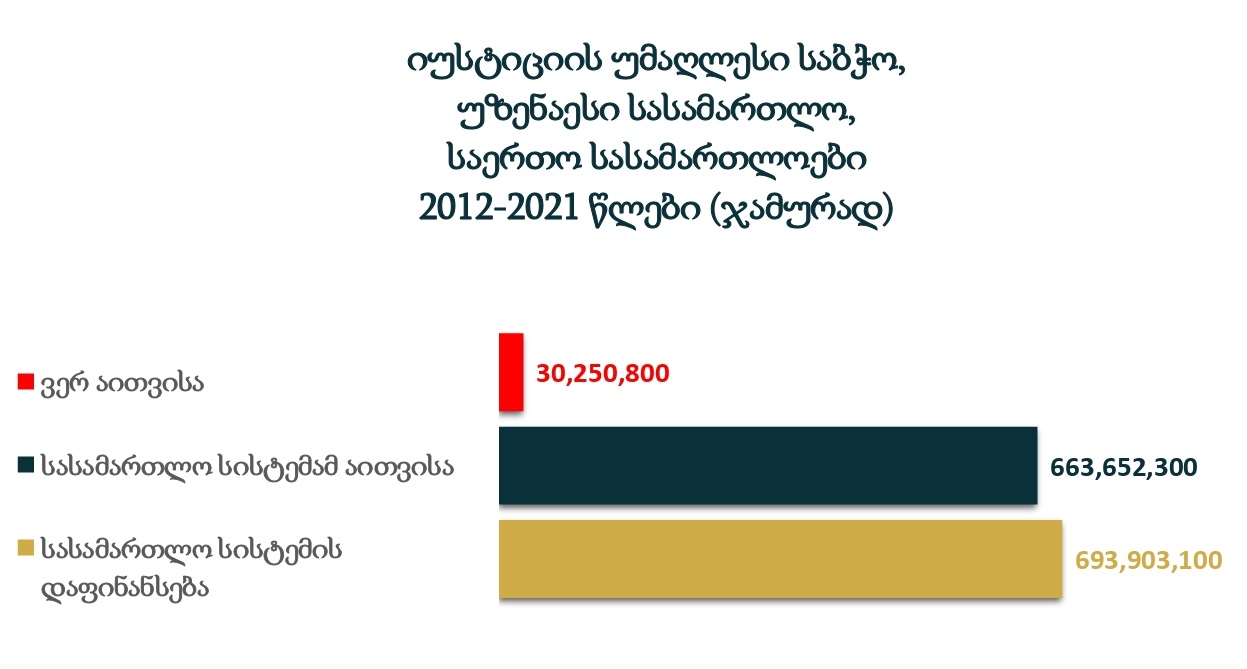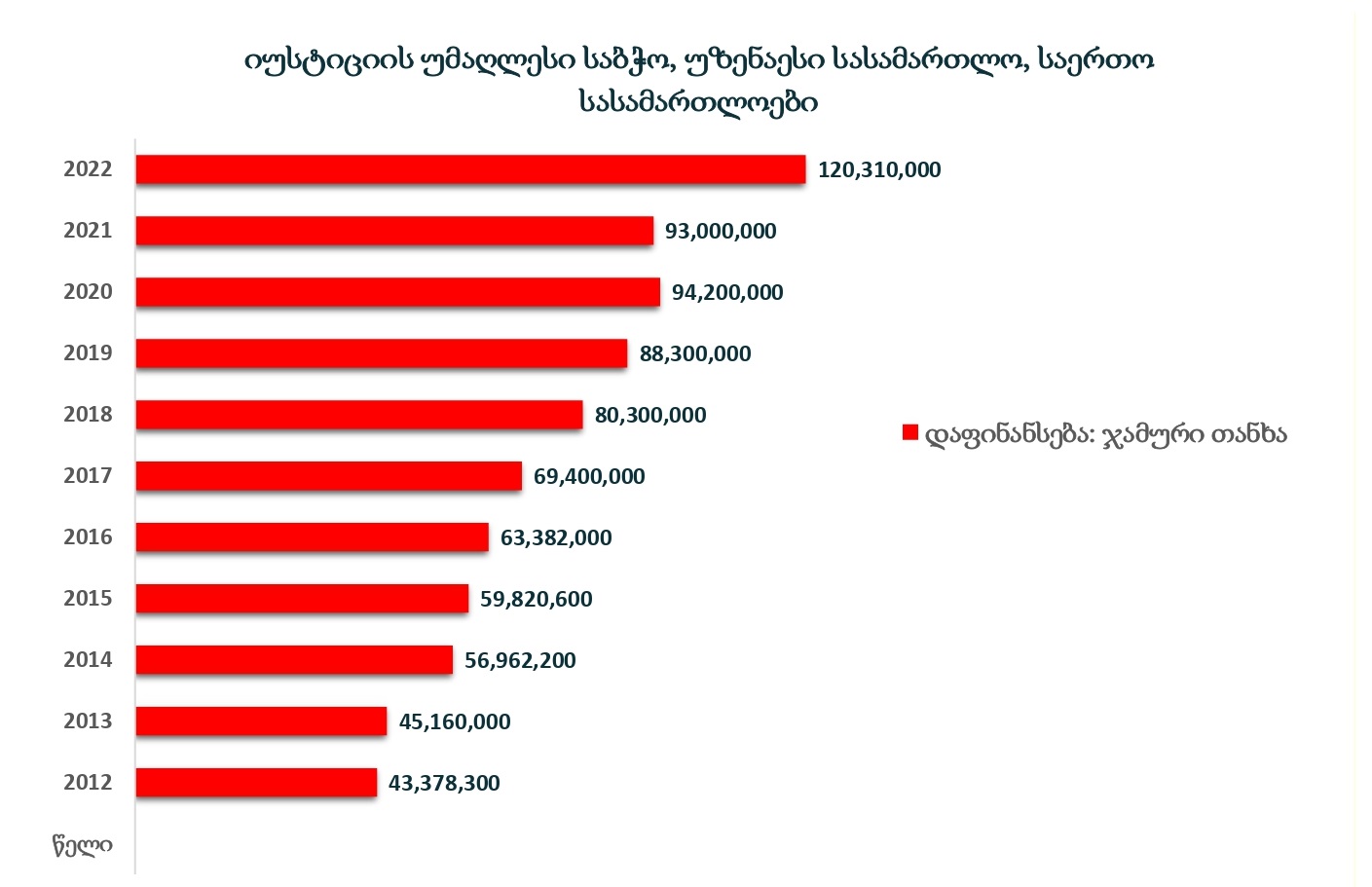Unexploited funds and unfulfilled priorities in the judiciary

Allocating sufficient funds to the judicial system is necessary for its independence and effectiveness which is indicated in a number of international documents. The UN Basic Principles on the Independence of the Judiciary and the European Charter on the Status of Judges require states to provide the judiciary with adequate resources so that the system can perform its functions properly. According to the European Network of Councils of Justice (ENCJ), adequate financing of the judiciary is a key element in ensuring and protecting the independence of the judiciary and judges.
The financing of the judiciary is a broad issue, involving the allocation of funds and the management of these resources. That is why "Georgian Court Watch" has studied the priorities and programs of the state budget regarding the judicial system of Georgia in recent years, also, data on spending of budgeted resources.
During the last 10 years (2012-2022), 1,387,806,200 GEL was allocated to finance the judiciary in Georgia which includes the Supreme Court, the General Courts and the Supreme Council of Justice. It is worth noting that funding has been increasing for the most part over the years.
Data for 2022 on utilization of allocated funds are not known at this stage.
.jpg)
.jpg)
.jpg)
The budget of the judiciary in 2012-2022 separately:
- Supreme Court
- General courts
- Supreme Council of Justice
.jpg)
.jpg)
.jpg)
During the years 2012-2021, the judiciary system has never fully utilized the allocated funds for it and during this period more than thirty million GEL remained unspent.


Priorities and programs are determined every year along with the funds allocated to the judiciary by the state budget of Georgia. As a result of the observation of the last few years, several noteworthy issues have been highlighted.
Freedom from political influence of the court
In the state budget of 2016, as in previous years, the reform of the judicial system is indicated as a priority, which meant "a court free from the influence of the political authorities". From 2017 to the present, freeing the court from political influence is no longer a priority. It seems that in recent years, the government no longer considered it necessary to declare this priority.
Public trust
Raising the public's trust in the court is one of the priority issues in the programs of the state budget for different years, although we find it in a different formulation.
The 2016 budget provided for the reform of the country's judiciary and the implementation of supporting measures for proper functioning, raising the public's trust and its involvement, in 2017, a record of the government's commitment appears in the state budget, which is repeated in the following years (2018-2020): "The actions of the Georgian government will be aimed at increasing confidence in the judiciary."
And, from 2021, every year, including in the 2023 budget, a new formulation is given: "The judiciary will continue to be strengthened, its independence will be strengthened and everything will be done to gain high public confidence in the court."
4-year cycle: technical error or superficiality
In the law on the state budget in 2017, the priorities of the judicial system are indicated, strengthening of the institutional mechanisms for the protection of human rights during the next 4 years. Although the 4-year term began in 2017, we find the same phrase in the budgets of subsequent years.
Therefore, it is unclear why was the countdown of the 4-year cycle started from the beginning every subsequent year and why was this same sentence written in the budgets of 2017, 2018, 2019:
"In the next 4 years, the institutional mechanisms for the protection of human rights will be further strengthened in Georgia."
Establishment of commercial collegium and chambers
From 2017 to 2020, the state budget determined the establishment of commercial collegiums and chambers in the system of General Courts, which would be specialized in considering commercial and tax cases. Despite the fact that this obligation was indicated for 4 years, in 2021 this issue disappeared from the state budget so much that commercial collegiums and chambers were not even created.
This issue was limited to the creation of specialization in commercial disputes in the Tbilisi City and Appeal Courts.
Filling vacancies for judges
In the state budgets of 2016 and 2017, "gradual filling of vacant positions of judges" was named as a priority, and from 2018 it was completely removed from the budget.
However, in the 2021 state budget implementation report, we read that "in order to gradually fill the vacant positions of judges, a selection competition for judges was held during the reporting period for 88 vacant positions in the appeals and district (city) courts, as a result of which 47 judges were appointed to the position by the Supreme Council of Justice on June 17, 2021. 25 of these, are current or former judges, who were appointed to the position of judge for life, and 22 - students of the High School of Justice were appointed to the position for a period of 3 years."
This record directly indicates the relevance of the issue of filling vacant positions and that the competitions announced in the judicial system are not completed with adequate results. Even today overcrowding of the court and delay of cases is one of the acute problems, which is indicated by the unfilled vacancies of judges during these years.
On November 25, 2022, according to the decision of the Supreme Council of Justice of Georgia, a competition was announced for 76 vacant positions of district (city) and appeal court judges. Only 21 candidates applied within the framework of the selection competition for judicial candidates.
The new priorities
From 2021, a different formulation of priorities appears in the state budget, in the program part about the judicial system, which is repeated in 2022-2023. To gain confidence in the court:
- "The following measures related to increasing the efficiency of the courts will be implemented: The number of judges and the number of officials of the court apparatus; the infrastructure of the courts will be improved; the electronic case management system and others will be improved;
- An electronic program for disciplinary proceedings will be elaborated and introduced;
- A complete electronic database of court decisions will be created;
- The activities of the Supreme Council of Justice of Georgia will be refined to improve the quality of the justification of its decisions.
State budget performance reports, priorities and programs related to the court in recent years have highlighted at least a few problems:
- The priorities and programs set by the state budget do not properly reflect the needs of the judicial system;
- The specified priorities and programs are not properly fulfilled;
- Despite many challenges, the amount provided by the state budget cannot be fully utilized by the judiciary.
---
The materials distributed by courtwatch.ge and published on the website are the property of "Georgian Court Watch", when using them, "Georgian Court Watch" should be indicated as the source.


































